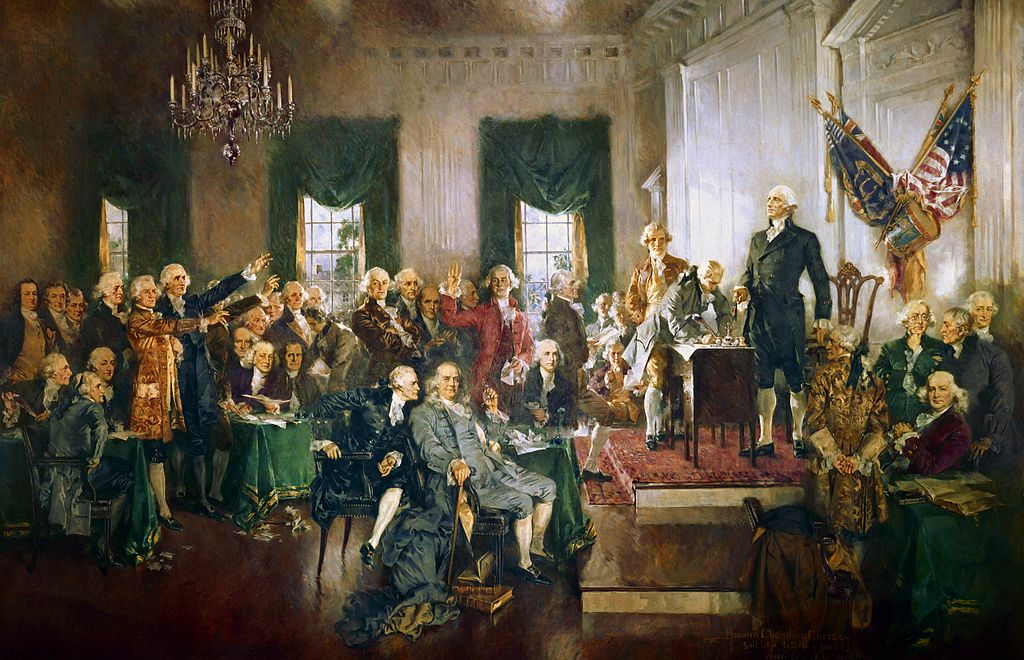Impeachment, Elections and Bad History
Law professor and former deputy assistant attorney general John Yoo this week declared, “What the framers thought was that the American people would judge a president at the time of an election. They would never have wanted an impeachment within a year of an election.”

Published by The Lawfare Institute
in Cooperation With

Law professor and former deputy assistant attorney general John Yoo this week declared, “What the framers thought was that the American people would judge a president at the time of an election. They would never have wanted an impeachment within a year of an election.”
He couldn’t be more wrong. Nothing in the Constitution, the framers’ debates or historical practice suggests presidents get a free pass during the final year of their term that allows them to avoid facing the sole constitutional remedy for treason, bribery or high crimes and misdemeanors. Presidential terms have a constitutional time limit; impeachment inquiries and impeachment votes do not.
Let’s start with why and how impeachment came up at the Constitutional Convention in 1787. The delegates in Philadelphia had debated having a presidency without limit, or one with a term of seven years or longer, but both ideas lost out. By choosing a four-year term, the framers ensured that any president who by policy or personality loses the support of the vast majority of Americans would not stay in office long. The next election, never far away, would provide the people the opportunity to boot that chief executive out and give someone else a shot at doing better. They saw an election, to put it simply, as the default way to deal with an unpopular president.
Impeachment came about as a different tool for a different problem: unfitness. “If he be not impeachable whilst in office,” William Davie told his fellow delegates on July 20 about the proposed president, “he will spare no efforts or means whatever to get himself re-elected.” Delegates’ arguments throughout the convention against an impeachment process, including the claim that a reelection of a president would be “sufficient proof of his innocence,” were rejected. Benjamin Franklin even argued that assassination had often been the only recourse for unfit leaders when polities lacked an impeachment process. “It [would] be the best way therefore,” he said, “to provide in the Constitution for the regular punishment of the Executive when his misconduct should deserve it, and for his honorable acquittal when he should be unjustly accused.” Elbridge Gerry, a future vice president, added his view of impeachments: “A good magistrate will not fear them. A bad one ought to be kept in fear of them.” Gerry, along with Davie, Franklin and the others, neither suggested nor obtained any restriction on when in his term the president would be subject to impeachment.
The full convention met on Sept. 8, 1787, to discuss the draft language on impeachment, calling for it only in cases of treason and bribery. George Mason asked, “Why is the provision restrained to Treason & bribery only?” He worried about what it left out and suggested adding “maladministration” as a third reason to impeach. James Madison then expressed concern that “so vague a term will be equivalent to a tenure during pleasure of the Senate.” Mason, less excited about his own idea now, withdrew it and suggested “other high crimes and misdemeanors.” No one seems to have objected, and they moved on.
After a few revisions by an editing committee, the delegates settled—out of exhaustion, if nothing else, given the many months of debate that had already taken place—on the language we see in the Constitution now: A president could be impeached by a majority vote in the House of Representatives for “Treason, Bribery, or high Crimes and Misdemeanors.” Removing that leader would then require a guilty verdict from at least two-thirds of senators present, in a trial with the chief justice presiding. The Constitution’s Article III, Section 3, helpfully defines treason against the United States, saying it “shall consist only in levying War against them, or in adhering to their Enemies, giving them Aid and Comfort. No Person shall be convicted of Treason unless on the Testimony of two Witnesses to the same overt Act, or on Confession in open Court.” Bribery, then and now, seems more widely understood. The phrase “high Crimes and Misdemeanors,” however, has long vexed scholars and politicians. Charles Black offers an admirable working definition. “High crimes and misdemeanors,” he says, “ought to be held to those offenses which are rather obviously wrong, whether or not ‘criminal,’ and which so seriously threaten the order of the political society as to make pestilent and dangerous the continuance in power of their perpetrator.”
Plainly, neither the text of the Constitution nor the debate surrounding the mechanics of impeachment ultimately ties the timing of an impeachment or even the subsequent trial in the Senate to the presidential election cycle. That makes sense, because elections and impeachments are different processes with different purposes.
We can also look to history to debunk the idea that an impeachment should not occur within a year of a presidential election. Take the first impeached president, Democrat Andrew Johnson. In February 1867, Congress overrode Johnson’s veto of the Tenure of Office Act, which required the Senate’s consent for the president to fire and replace identified executive branch officers, including the secretary of war—at that time, Edwin Stanton. Unfortunately for Johnson, Republicans for the first time in American history held not only a majority in the House of Representatives but also a two-thirds majority in the Senate, the threshold needed to remove an impeached president.
And on Feb. 21, 1868, Johnson handed Congress a reason to impeach, by removing Stanton (who refused to leave his office, even to go home or to cabinet meetings). The House of Representatives held a quick vote three days later and—with the next presidential election a mere nine months away—impeached the president.
After a two-month trial in the Senate, Johnson managed to squeeze out exactly the number of votes he needed to prevent his removal. Senators’ reticence to boot the president out of office came from several factors: weakly drawn articles of impeachment, quiet deals with the White House, promises made or implied by the president regarding political favors or better presidential behavior, concerns about the man (Senate president pro tempore Benjamin Wade) who would become president were Johnson to leave office, and the good odds of winning the next election against a weakened Johnson with the widely popular Ulysses Grant. But the decision to acquit the president did not hinge on an errant belief that the framers frowned upon election-year impeachments.
Yoo’s line about not acting against an unfit president within a year of a presidential election echoes less the framers’ views than those of Senate Majority Leader Mitch McConnell. On March 16, 2016, Obama nominated Merrick Garland, chief judge of the U.S. Court of Appeals for the D.C. Circuit, to fill the Supreme Court vacancy created by the death of Antonin Scalia. But as Obama left office on Jan. 20, 2017, McConnell hadn’t granted Garland even a single hearing, much less a confirmation vote, for 293 days.
In that case, Republican senators’ logic against scheduling hearings for the popular and well-qualified nominee was simple: politics. Some cited historical precedent, but they forgot to check to ensure history fully supported their view. “Standard practice,” Sen. Chuck Grassley said, allowed senators to take no action on Garland several months before the election. Many examples, in fact, showed such nominations had been acted on normally. A striking one is that of Peter Daniel. In late February 1841, Democratic President Martin Van Buren—who had been defeated in his reelection bid the previous November—stood ready to hand the reins of power over to the Whig president-elect, William Henry Harrison. With less than a week left in his term, Van Buren nominated Daniel to the Supreme Court. Despite congressional complaints about the “indecent haste” of the nomination, Daniel received Senate confirmation in a land-speed record for lame-duck high court nominees.
At least in the Garland case, McConnell and other senators could fall back to the undeniable fact that while Article II, Section 2, of the Constitution states that appointments to the Supreme Court require the consent of the Senate, it remains silent on how or when that consent should come. This lack of clarity in the Constitution about what counts as timely consent for judicial confirmations, however, does not extend to impeachment.
When reasonable evidence of treason, bribery, or high crimes and misdemeanors emerges, impeachment and removal stands as the proper remedy—as the framers intended. It is the duty of representatives to investigate such impeachable acts, using the best method those delegates from the summer of 1787 could devise, regardless of the proximity of the next presidential election.




